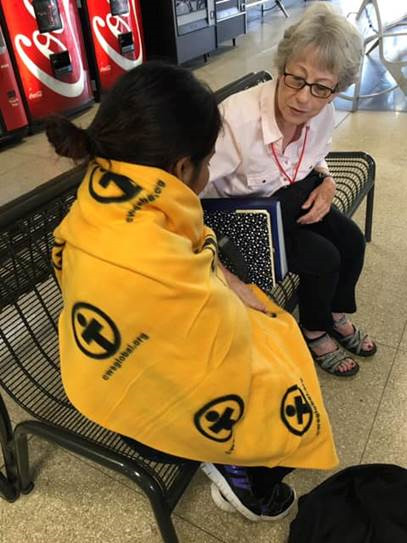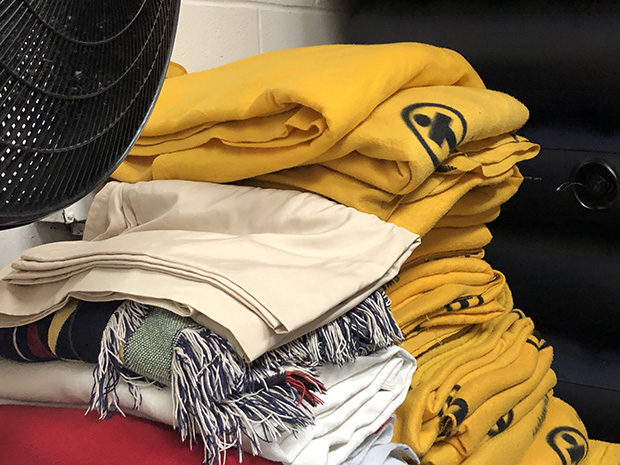
Joyce Hamilton helps a young woman after she was released by ICE. Photo courtesy Angry Tias and Abuleas.
In June, 2018 the major news networks arrived in the Rio Grande Valley of Texas, turning their cameras to the walkways of the international bridges over the Rio Grande, and the effects of the Zero Tolerance policy on asylum-seeking families at the border was revealed to the country and the world. Observant television viewers and readers of news reports could see families (mothers with small children and infants) sleeping on concrete walkways with nothing but a sheet of cardboard underneath. What those of us who had been to visit the families knew was how long they had been waiting and sleeping on those walkways. For most it was five days or more.
Before the media arrived, a group of local women had been visiting the bridges for a couple of weeks, carrying food, water, sun umbrellas and other supplies to help these folks get by and to let them know they were cared for. We named ourselves the Angry Tias and Abuelas of the Rio Grande Valley (angry aunts and grandmothers). Our anger was at the injustice and cruelty dealt to these desperate families.
In the first couple of weeks, it was raw and quite shocking, and those faces I will carry with me for the rest of my life, those eyes mixed with desperation, fear, and hope, but mostly with a fierce determination to wait it out for the sake of their children’s lives. They’d sleep on concrete for as long as it took for that door to open at the end of the bridge and let them in to apply for asylum. Their countries of origin were mostly Guatemala, Honduras, and El Salvador, called the Northern Triangle, a region filled with violence and danger, and little hope for any future life for the children. Over time we have learned their stories, told simply but sadly, of family members threatened with death or rape if they didn’t join a gang, and then threats fulfilled, of forced fee payments to cartels and gangs that destroyed whatever livelihood they had mustered day by day. They leave family members behind, those who are older who cannot handle the rigors of the journey, and they miss them and grieve. Going forward, going north, to family members who left years ago to the US, is their only hope.
We searched for sleeping mats for them. It took a while, and we had minimal success, finding some gym mats thick enough to give comfort that could be folded up and moved to the side of the walkway during the day, or carried off the bridge for storage when someone got lucky and was allowed to cross to the US. You never think about those details until you’re inside the crisis, working through the logistics, but the mats disappeared after a while, as people gradually were allowed to cross and supplies were either confiscated, left behind, or lost. A cushioned sleeping surface was a complicated business. And it continues to be.
We Angry Tias and Abuelas soon found ourselves working on all fronts in what felt like a hurricane of crisis response. While we continued running to the bridges in primarily Matamoros and Reynosa, we were finding needs in other locations as well. We quickly discovered families being dropped off at local bus stations and shelters by ICE or CBP, with nothing but the clothes on their backs after a 2-day stay in a cold, unwelcoming processing center, after a long tortuous journey from their homeland. Angry Tia Elisa Filippone was shocked to find young women released from a local detention center dropped off by ICE at the Brownsville bus station an hour before closing time of 11:00 p.m., with tickets for the next morning. Moving immediately to problem-solving, Elisa found local people willing to lodge the young women for the night and return them to the station the next morning. Soon a nearby homeless shelter, the Equal Voice Network, Elisa, and a team of local volunteers created a humane and orderly system to care for the released detainees. A nearby homeless shelter became the answer to the overnight lodging, and the newly-formed Team Brownsville local volunteer group stepped up to become a powerful, welcoming force for travelers at the bus station as well as for those waiting at the bridge.
Meanwhile the Tias and Abuelas were stuffing backpacks. My church in Harlingen offered the use of the fellowship hall and a small storage area, to fill the backpacks for the families at the bridges and bus stations. Following the guidance of an organization in San Antonio where my sister Linda volunteers, we learned where and how to order backpacks, snacks, and toiletries to fill the packs. We added small inexpensive throw blankets from Walmart, and travel pillows (now known as Pillows of Love) made by the mother of a Brownsville volunteer. We took the backpacks to the bridges where asylum seekers were still coming, and waiting, and to the bus stations for the weary but hopeful families, processed and released by Border Patrol, and now heading out on yet another long journey, this time by bus.
In this journey of faith in God and hope for the future, many determined but exhausted travelers have had to sleep on the ground, on packed dirt, a concrete walkway, or even on sharp rocks and gravel when there is no other option. The seriously overcrowded Mexican shelters in Reynosa and Matamoros have only the concrete floor for their weary guests.
In Matamoros, across the bridge from Brownsville, where an international community of asylum seekers has developed just outside the bridge entrance, small tents have been set up to keep families out of the weather. The tent floors sit on concrete. If they are lucky a family might find some light blankets to place on the floor of the tent, but some are sleeping on the ground or on park benches in the nearby plaza.
A call from Presbyterian Disaster Assistance in April was an answer to prayer. Ed Sackett, Presbyterian Disaster Coordinator, called to ask for assistance in distributing 1,600 blankets soon to arrive in McAllen from Church World Service. The plan: get the blankets to where there is the greatest need. Wow! An act of Christian love and generosity was on the way to cushion a whole lot of weary bodies and souls.

A pile of CWS Blankets in Good Neighbor Settlement House, which would soon be distributed to asylum seekers.
The blankets arrived in McAllen on April 25, 2019. A local congregation graciously opened up storage space in the fellowship hall and personally organized and loaded blankets onto carts, with the help of a small group of volunteers. Some of the volunteers loaded their cars and trucks with blankets and delivered them to shelters in Brownsville and Harlingen and to Elisa in Brownsville who crossed into Matamoros and delivered the heavy blankets for sleeping pallets to the tent-dwelling community there.
Arriving at the McAllen church in their 15-passenger van with seats removed, a team from a shelter in Matamoros gathered hundreds of heavy blankets for sleeping pallets and light summer blankets into the van. In his generous way, They offered to keep and distribute as many of the blankets as needed for the Matamoros tent community not far from the shelter, and to assist in getting some of the blankets to Reynosa’s shelters as well, a considerable drive from Matamoros on a Mexican highway known for safety issues and cartel interference. With the help of Doctors Without Borders, they managed to get hundreds of the blankets transported from the Matamoros shelter to a shelter in Reynosa. Later a fearless member of the Angry Tias with a lot of love in her heart who visits the Reynosa shelters on a regular basis succeeded in driving a carload of more blankets across the Reynosa/Hidalgo bridge to the shelter in Reynosa.
Shortly before the blankets arrived in McAllen, a new group of asylum seekers had begun to arrive at the Progreso/Nuevo Progreso bridge a few miles south of Weslaco in what is called the Mid-Valley, approximately halfway between Brownsville and McAllen. The newly-arrived asylum seekers, many from Cuba and Honduras, were sleeping on the concrete walkways and plaza near the bridge entrance. With a visit to the bridge already planned for that day, one of the first deliveries of the heavy blankets on April 25 was made by an Angry Tia and a local newspaper reporter who moved beyond news gathering into direct volunteer action. Lorenzo loaded his vehicle at the church with blankets and drove them to the Progreso bridge where they were distributed to some very grateful folks that evening in Nuevo Progreso.
So those thick, heavy grey blankets are now seen on the bridges and in the tent encampments, and at the Mexican shelters, and the cheerful yellow lightweight blankets are seen at the bus stations tucked into large reusable shopping bags filled with travel supplies and snacks at the shelters where families released from BP processing stay briefly before bus departures. A two-day trip in an air conditioned bus will be cozier with the blankets. The yellow blankets are also seen on the overnight cots in Harlingen, and in the arms of kids at a shelter in Reynosa, Mexico. They convey a sense of comfort, warmth, and hope. It’s remarkable how blankets can do that.
Church World Service, through Presbyterian Disaster Assistance, and with a little help from a few Angry Tias and Abuelas on the Texas-Mexico border, has cushioned the blow of a difficult journey and given warmth, comfort and hope to a whole lot of humble, hopeful families soon to be our neighbors, friends, and church members all over the country. Muchisimas Gracias!
Joyce Hamilton is an Angry Tia and Abuela and a Member and Elder at a church in Harlingen, Texas.
We’ve shipped more than 49,000 CWS Blankets to the U.S.-Mexico border for shelters and programs like this one.